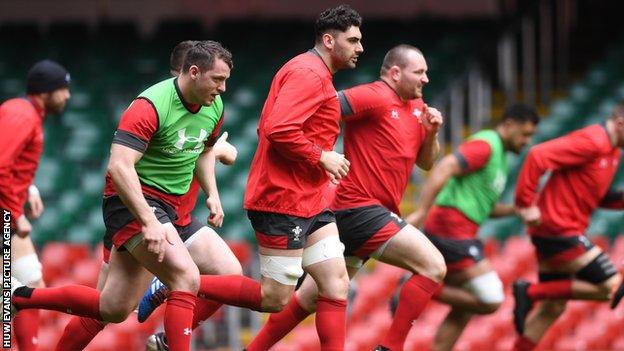Coronavirus: Welsh Rugby Union chairman Gareth Davies defends Six Nations postponement
- Published
'I'm surprised it's taken so long' - Scotland fans on Cardiff call-off
Welsh Rugby Union chairman Gareth Davies has defended the decision to postpone Wales' Six Nations match against Scotland in Cardiff just 24 hours before kick-off.
The WRU had said earlier on Friday that the game at the Principality Stadium would go ahead but then called it off because of the coronavirus outbreak.
"It has been a tough week," said Davies.
"But we believe it was the proper and responsible thing to do."
Davies added: "I don't think we could've dealt with it any better. We made a decision last night that this match would go ahead. In a very quickly moving world things had changed by late morning today."
Several sports have been severely disrupted, with all Premier League and EFL football matches suspended until 3 April.
The Cardiff game was the last major sporting event to be postponed this weekend despite government medical advice saying the match could still potentially be played.
"We initially followed the advice of government in terms of the scientific and medical evidence and that was the case up until last night," said Davies.
"We had an emergency board meeting last night to consider everything and we still thought, bearing in mind the advice we had, that keeping the game on was the way to go.
"Last night the Premier League were carrying on but by this morning that had changed and the EFL went on a similar course as did the Celtic v Rangers game in all being called off and other major global events were also being pulled
"We spoke to the Government this morning, who understood our position.
"For us to be the only sporting event to be on, we were mindful of the seriousness of the situation. We took into account supporters, players and staff and asked whether it was essential to subject to that risk."
"We've made a judgement as to whether there was a danger. By the time we arrived at lunchtime today we thought there could be exposure so we decided to pull the game."

Gareth Davies is a former Wales captain
Davies denied they were forced into the decision by public opinion.
"I wouldn't say it was public backlash; we took everything into account," said Davies.
"We know despite the government and advice saying there's no evidence there would be a spike at a major event.
"When you take everything into account with what's happened in Italy, there will be spikes.
"The medical advice says 60% of the population are going to catch this disease and I don't think we wanted to be the mid-point of that.
"We reassessed the position, other sporting bodies decided to change their stance, and we made the decision that was the most sensible decision to take."
Davies admitted he sympathised with fans who had travelled to Cardiff already and had spent money on accommodation and tickets.
"I understand and sympathise with that scenario," said Davies.

Wales players in training hours before the Six Nations match against Scotland was postponed
"There's not a lot we can do in that respect because we took the responsible decision for 75,000 in this stadium possibly being subjected and open to this killer disease.
"When the match is finalised, we'd advise people to keep their tickets safe.
"Hopefully they'll be able to come to the match if they're unable for whatever reason we can look to refund them."
There are four Six Nations matches to be rescheduled - the three final-round games, plus the Ireland v Italy game in Dublin, which was postponed from 7 March.
Saturday, 31 October is a possible date for the final weekend of matches.
"It's an understatement to say it's unsatisfactory the four matches won't be completed," said Davies.
"There will inevitably be an anti-climax when the games are played but we want to finish the tournament.
"We're not sure when that's going to be. The Six Nations will have to take soundings and make a decision in the next few weeks.
"It's difficult to plan at the moment because who knows how long this episode will last? The likelihood from what I've picked up is that it'll happen in the autumn sometime."